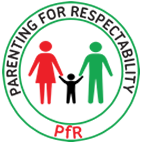Why the Parenting for Respectability programme (PfR) was developed
- Most parents hope that their children will row up to be bright, happy, healthy, well behaved and successful in life. These things are all influenced by parents’ behaviour towards their children.
- Research in both high income countries and in Africa shows that the way parents bring up their children (parenting) influences their children’s development, behaviour and wellbeing.
- This influence lasts throughout childhood, into adolescence and adulthood. For instance, poor parenting, especially before the child goes to school, makes it more likely that the child’s brain will develop slowly. It also makes it more likely that later in life the child will behave badly, be violent, start sex early, take drugs, or suffer from depression and anxiety.
- These problems are particularly likely to occur if parents are very harsh, do not praise their children for positive behaviour, do not interact with their children, or have a lot of conflict with their spouses. Parenting programmes can help parents avoid these behaviours and develop good ways of parenting.
- Gender based violence and violence against children are widespread in Uganda. Research has shown that within families there are four key factors which make it more likely that boys will go on to commit GBV, or girls more
likely to suffer from GBV:
i) poor connectedness or love between a parent
and child
ii) harsh parenting, especially corporal punishment
iii) treating girls as inferior to boys
iv) conflict between parents, especially violence - There are three special features which make the Parenting for Respectability programme different from most parenting programmes:
i) it aims to include fathers as much as mothers,
and starts with father-only and mother-only
sessions
ii) it focuses on a particular concern of both fathers and mothers, that their children should
be well behaved and maintain the family’s
respectability
iii) it assumes that through discussion and reflection, parents can often find the best ways to
bring up their children themselves


